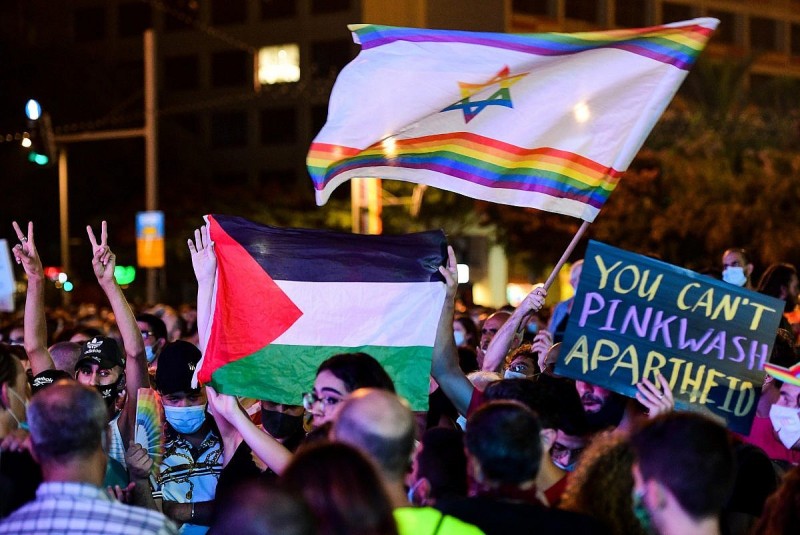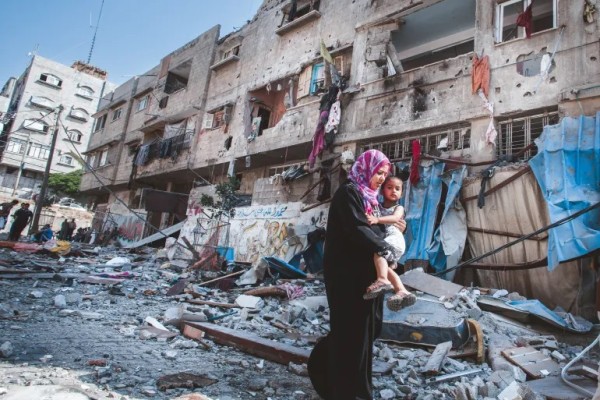Reclaiming solidarity
We need to reject the cooptation of feminism and the LGBTQ+ movement in the service of Islamophobia and anti-Palestinian racism

Photo by Avshalom Sassoni/Flash90
Those of us involved in feminist and social justice-oriented fields of study sometimes hear that the sexual violence of October 7 means we should forever remain silent on the ethnic cleansing, occupation, dispossession, and displacement of the Palestinian people.
In the wake of October 7, journalists indignantly called out feminists for not addressing this violence sufficiently, arguing “To see feminists overlooking violence against women because of their allegiance to either Israel or Palestine makes a mockery of feminism.” The same critics have had little to say about the countless overlooked and ignored examples of sexual violence perpetrated against Palestinians in Israeli prisons and by IDF soldiers before and since that day. Also swept aside are reports that some of the violations and atrocities initially reported on have since been disputed or corrected as insufficiently supported by evidence or as distortions to justify the collective punishment of a civilian population.
This is not an effort to erase or minimize trauma in the service of moral selectivity. Assuredly, it is unforgivable that women’s bodies—Israeli, Palestinian, and across the world—continue to be the target of sexual violence, especially in zones of “conflict.” At the same time, women’s bodies are too often the grist for propaganda demonizing the other as well. The West has a long history of appropriating sexual and gender-based violence more generally to serve its ideological agenda. One particularly salient example of this tendency is the post 9/11 liberal project Lila Abu-Lughod terms ‘securofeminism,’ which focuses with particular intensity on the Middle East and in many respects constitutes a throwback to second-wave, white, liberal feminism that sought out rights for certain women while casting other women as a homogeneous population of eternal victims without agency or importance. Sexual violence is indeed shocking. It is also an astonishingly effective mechanism to silence dissent that does real injustice to survivors. As a December 2023 position paper collaborated on by six Arab Women’s Organizations Against Rape reminds us, feminism should be indivisible on this issue at least.
On a continuum with increasingly common efforts to frame criticism of Israel as anti-feminist is the marketing (and colonial) strategy known as pinkwashing, whereby apologists and advocates attempt to rehabilitate Israel’s image by contrasting its stated position on LGBTQ+ rights with that of Muslim majority countries and Palestinians more specifically. As the Al Qaws, an organization that promotes sexual and gender diversity in Palestinian society, reminds us, pinkwashing goes beyond public relations as a symptom of settler colonialism and form of violence “that can help us understand how Israel divides, oppresses, and erases Palestinians on the basis of gender and sexuality.” This strategy is as old as the mainstreaming and corporatization of the Pride movement by Western capitalist institutions and businesses, but in times like this, it is wielded with impunity as one of many weapons in the pro-Israel ideological arsenal to stifle critics on the left. The effectiveness of this strategy stems from its cynical manipulation of the vulnerability of historically persecuted populations. It preys upon fears and anxieties arising from individual or collective, recent or historical trauma, and it redeems as a saviour and protector of LGBTQ+ folk a state notorious for its human rights abuses (and governed by right-wing politicians by no means exempt from homophobic and transphobic views and agendas). However, as Al Qaws maintains, “There is no ‘pink door’ in the apartheid wall.”
In a 2016 article for In These Times, Jimmy Pasch denounced this “reductive” marketing ploy and called on queer people to “resist single-issue politics that help LGBTQ people in positions of relative social power while ignoring the realities that affect the most marginalized in our communities. We have to hold institutions that claim to speak for us accountable, as we try to understand and undermine oppressive power structures rather than reinforce them.” In 2024, as attempts to repress freedom of expression intensify, there is an urgent need to reclaim the right as feminist and queer academics to denounce all systems of oppression. Intolerant elements within a society do not justify the eradication of a people or give us license to turn away from (or be complicit in) their suffering. Palestinians do not forfeit the right to exist because opportunistic champions of LGBTQ+ rights seek to promote an Orientalist narrative that erases queer Palestinian identity and perpetuates racist stereotypes of the sort shamelessly flaunted in this May 18 Telegraph editorial proclaiming, “Admitting Gazan refugees would be proof that Britain has a death wish: We have no idea how many Palestinians support their murdering, raping masters.” At any rate, in the wake of unprecedented attacks on so-called gender ideology and rising anti-trans violence, the United States and Canada can scarcely claim the moral high ground. Pinkwashing, rainbow washing—all of it—fades in its lustre when one looks to the record of Israel—in which same-sex marriage has yet to be legalized—or closer to home.
The illogic of a defense of Israeli state violence that grants Palestinians the right to be queer but not to exist is not lost on student protesters who see through the rhetorical contortions, inconsistencies, and false narratives. In this moment, they look to us to reclaim solidarity and amplify the voices of Palestinian (especially queer Palestinian) and BIPOC academics, activists, and students who have been speaking out all along. With Pride month approaching, it is a good time to rediscover intersectional advocacy and resist the co-optation of both feminism and the LGBTQ+ movement in the service of Islamophobia and anti-Palestinian racism.
In the process, let us not forget to stand against genuinely abhorrent antisemitism, just not the all-purpose, all-encompassing definition that works in tandem with the strategies outlined above to suppress protest and solidarity, and which the controversial Bill 166 would seek to enforce on university campuses throughout the province.
Kelly McGuire is an Associate Professor in the departments of English and Gender & Social Justice and Trent University.










